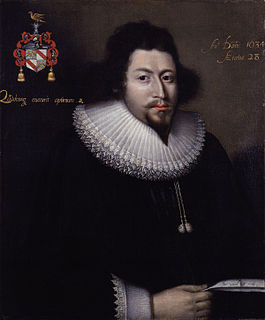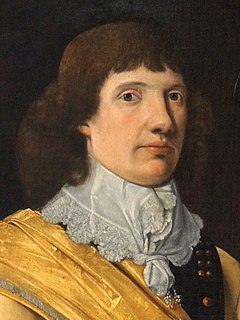Related Research Articles

The Long Parliament was an English Parliament which lasted from 1640 until 1660. It followed the fiasco of the Short Parliament, which had convened for only three weeks during the spring of 1640 after an 11-year parliamentary absence. In September 1640, King Charles I issued writs summoning a parliament to convene on 3 November 1640. He intended it to pass financial bills, a step made necessary by the costs of the Bishops' Wars in Scotland. The Long Parliament received its name from the fact that, by Act of Parliament, it stipulated it could be dissolved only with agreement of the members; and, those members did not agree to its dissolution until 16 March 1660, after the English Civil War and near the close of the Interregnum.

Richard Cromwell was an English statesman who was the latter Lord Protector of the Commonwealth of England, Scotland and Ireland and son of the first Lord Protector, Oliver Cromwell.

The Protectorate was the period during the Commonwealth during which England and Wales, Scotland, Ireland and the English overseas possessions were governed by a Lord Protector as a republic. The Protectorate began in 1653, when the dissolution of the Rump Parliament and then Barebone's Parliament allowed Oliver Cromwell to be appointed Lord Protector of the Commonwealth under the terms of the Instrument of Government. In 1659, the Protectorate Parliament was dissolved by the Committee of Safety as Richard Cromwell, who had succeeded his father as Lord Protector, was unable to keep control of the Parliament and the Army. That marked the end of the Protectorate and the start of a second period of rule by the Rump Parliament as the legislature and the Council of State as the executive.

The Rump Parliament was the English Parliament after Colonel Thomas Pride purged the Long Parliament, on 6 December 1648, of those members hostile to the Grandees' intention to try King Charles I for high treason.

Sir Bulstrode Whitelocke was an English lawyer, writer, parliamentarian and Lord Keeper of the Great Seal of England.

Nathaniel Fiennes was an English politician who sat in the House of Commons at various times between 1640 and 1659. He was an officer in the Parliamentary army during the English Civil War and an active supporter of the republican cause during the Interregnum.
John Desborough (1608–1680) was an English soldier and politician who supported the parliamentary cause during the English Civil War.
John Wilde was an English lawyer and politician. As a serjeant-at-law he was referred to as Serjeant Wilde before he was appointed judge. He was a judge, chief baron of the exchequer, and member of the Council of State of the Commonwealth period.
John Clarke, also known as John Clark, John Clerk, and John Clerke, was an English politician and Justice of the Peace who sat in the House of Commons from 1653 through 1660, and was a colonel in the Parliamentary army between 1651 and 1659.
Sir Thomas Andrewes was a London financier who supported the parliamentary cause during the English Civil Wars, and sat as a commissioner at the High Court of Justice for the trial of Charles I. During the Third English Civil War, as Lord Mayor of London, he made sure that there was no trouble in London. During the Interregnum he supported Oliver Cromwell, and was knighted by him in 1657. Many sources confuse him with another Thomas Andrewes, who had a more prominent role in the British East India Company and was a contemporary of the London politician; this other Andrewes was still alive in 1660.
Sir John Fagg, 1st Baronet was an English politician who sat in the House of Commons of England at various times between 1645 and 1701. During the Civil War, he fought on the Parliamentarian side as a colonel in the New Model Army.
John Stone was an English politician who sat in the House of Commons between 1653 and 1659.
Miles Jackson was an English politician who sat in the House of Commons in 1654 and 1656.
Robert Scawen (1602–1670) was an English politician who sat in the House of Commons at various times between 1640 and 1670. He supported the Parliamentary cause in the English Civil War.
Thomas Whitmore was an English lawyer and politician who sat in the House of Commons from 1659.
William Collins was an English politician who sat in the House of Commons from 1654 to 1659. He supported the Parliamentary cause in the English Civil War.
George Thomson was an English merchant and Parliamentarian soldier, an official and politician.
Sir Francis Warre, 1st Baronet, of Hestercombe House, Kingston, Somerset, was a British landowner and Tory politician who sat in the English and British House of Commons between.1685 and 1715.
Sir Thomas Earle, of Bristol and Crudwell, was an English merchant and politician who sat in the House of Commons from 1681 to 1685.